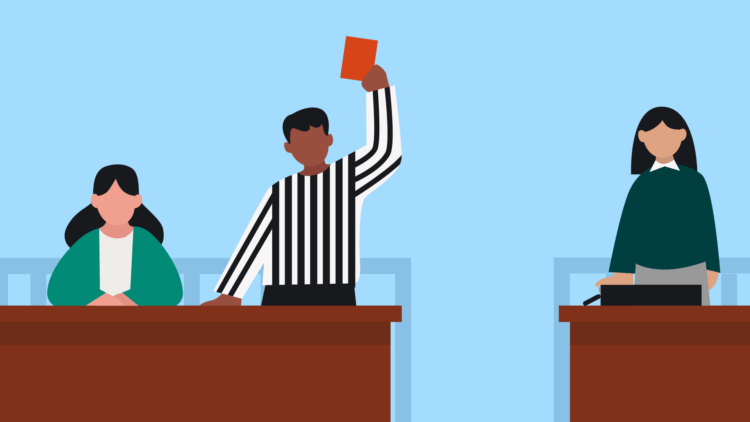Depression in the legal profession is widespread, with far-reaching impacts. For attorneys struggling with lawyer depression, the illness can have devastating personal and professional repercussions—but it also affects clients, partners, staff, and business.
Depression affects a significant portion of the general population, with 8.3% of all adults in the United States—21 million adults—having suffered a major depressive episode in 2021. But the rate of attorney depression is even higher: ALM’s Mental Health and Substance Abuse Survey in 2020 noted that 31.2% of the more than 3,800 respondents feel they are depressed. This means that lawyers are roughly three times as likely to suffer from depression than the average US adult.
Still, the stigma of mental illness prevents lawyers from seeking prompt treatment. This can lead to extended and unnecessary suffering, which exacerbates the issue over time.
To achieve positive changes around mental wellness, legal professionals need to learn how to recognize attorney depression and seek help as early as possible. Not only will this help legal professionals on a personal level, but it can also eventually change the conversation around lawyer wellness and mental health.
In this blog post, we’ll look at the signs and symptoms of depression, and how to recognize them. We’ll also offer strategies for managing lawyer depression and resources to help you deal with it.
Why are most lawyers depressed?

While there isn’t one direct answer for the pervasive nature of depression in the legal industry, the following factors likely contribute to the issue:
1. Lawyers tend to be perfectionists. To succeed in their legal careers, lawyers have to be high achievers. While this level of perfectionism can be useful when working on a client’s case, it can also cause consistent stress.
2. Lawyering is a high-stress, high-stakes, high-performing profession. Working in a competitive industry under constant pressure to perform also primes lawyers for mental health struggles.
3. Law school does not fully prepare lawyers for a career in law. A legal education prepares lawyers to practice law. But a career in law requires top-notch communication, financial, and management skills. Law school does not properly equip lawyers with these skills and few lawyers inherently possess them.
Additionally, many lawyers are not equipped with self-care, resilience, and mental wellness strategies. But lawyers and legal professionals need these critical skills to deal with the emotional stress and trauma that often comes with working with legal clients.
4. The legal industry has a prevalent burnout culture. Burnout is characterized by the World Health Organization as a syndrome resulting from unmanaged chronic workplace stress. Many lawyers suffer from ongoing, extreme physical and emotional exhaustion and stress that can leave them depleted. These symptoms of lawyer burnout can also overlap and with symptoms of lawyer depression.
5. Mental illness stigma. Legal professionals fear being treated differently or discriminated against because of mental illness. This is a serious issue that contributes to more than half of people with mental illness not receiving help and many more putting off or avoiding treatment.
Mental illness stigma starts early
As lawyer and wellness speaker Brian Cuban explains on an episode of Clio’s Daily Matters podcast, fear of stigma often starts when applying for the bar exam. “When law students prepare to take the bar, fill out the necessary application, you have to go through the character of fitness test. That is a fear of law students everywhere,” he says. “And certain jurisdictions do ask questions where a law student can look at that and say ‘You know what? I’m not going to get treatment for what I’m going through, because if I get treated, I’m going to have to disclose it.'”
Once attorneys are practicing, that fear of support resources persists. Many lawyers are afraid that reaching out for help could have negative implications for their careers. As Brian notes, this fear is widespread, though often misguided:
“They think that will get out and that it’s a pipeline to the State bar who will discipline them, or they’ll face some type of consequences: It’ll get out to their law firm, the client world, and then they won’t get hired or they won’t make partner. This is a very real stigma that isn’t all based on reality.”
For more of Brian’s insights into the prevalence of mental illness and substance-related issues within the legal industry, you can watch Brian’s upcoming online webinar.
How to recognize the signs of lawyer depression

Depression is an illness—it’s not just a state of mind or something that anyone can“snap out of.” With this in mind, you need to know the signs of depression so that you can get professional help as early as possible.
Note that people’s individual experiences with depression are unique and not everyone will encounter the same struggles. But these are some of the common signs and symptoms of depression to look for based on information from the National Institute of Mental Health—especially if you have been experiencing the symptoms most of the day, most days, for at least two weeks:
Emotional symptoms
- Lack of joy. Do certain activities or hobbies (or even work) that used to bring you happiness no longer interest or please you?
- Low mood. Are you consistently and persistently feeling sad, anxious, or irritable?
- A sense of emptiness. Do you feel hopeless, pessimistic, or “empty” consistently?
- Feeling guilty. Do you experience ongoing and inappropriate feelings of guilt, worthlessness, or helplessness?
Physical symptoms
- Aches or pains. Do you feel physical pain in your muscles or joints with no clear cause that doesn’t get better with treatment? Do you have unexplained headaches?
- Cramps, or digestive problems. Do you have unexplained digestive and stomach troubles or pains with no clear cause that don’t get better with treatment?
- Unintentional shifts in appetite and/or weight. This could mean a significant loss of appetite or weight or an unexplained appetite of weight gain.
- Sleep struggles. Do you have difficulty sleeping, insomnia, or fragmented sleep? Or, do you suddenly oversleep or sleep all the time?
- Decreased energy or fatigue. Do you feel listless or overwhelmingly low energy?
- Changes in pace. Are you moving or talking more slowly? Do you have trouble sitting still, or do you feel restless?
Mental symptoms
- Difficulty concentrating. Do you have trouble focusing, remembering, or making decisions?
- Thoughts of death. Recurrent thoughts of death or death by suicide are red-flag signs to seek help immediately.
If you or someone you know are experiencing thoughts of death or death by suicide, seek help immediately. You can call the National Suicide Prevention Lifeline, which offers free and confidential emotional support to people in suicidal crisis or emotional distress 24/7.
You may like these posts
How depression affects your quality of life
It’s common for people to try to brush off mental health challenges—lawyers are no different. But the reality is that lawyer depression affects everything in your life in a negative way. This includes your overall quality of life, work, business, and client experiences.
As lawyer and creator of Lawyers with Depression Daniel Lukasik shares, unmanaged depression can make it incredibly difficult to concentrate on and deal with legal work. In Daniel’s case, major depression led to fragmented sleep and eventually, an inability to engage with his family life.
It is critical to manage depression as early as possible, with the help of a professional.
How to deal with lawyer depression
Dealing with attorney depression means finding ways to manage and treat it, just as you would with a chronic physical illness. Managing depression is possible. It’s also important to do it as soon as possible. There is no one-size-fits-all solution for lawyer depression, but the following can help.
1. Seek help from a mental health professional early

Finding a trusted doctor or mental health professional to treat lawyer depression is essential. Treatment for depression is complex. It may or may not involve medication, psychotherapies, brain stimulation therapies, and other treatments. A mental health professional will likely suggest a combination of treatment options depending on a specific experience with depression. While turning to others for help can feel uncomfortable at first, a qualified mental health professional will guide you to the appropriate therapies.
The earlier you can recognize that you may be struggling with depression and seek professional intervention and support, the better and more effective your treatment will be. Symptoms of depression tend to compound and worsen over time. This makes it more difficult to seek treatment the longer you wait.
Part of the power of seeking help from a mental health professional comes from the act of speaking up and opening up about your struggle. As lawyer coaches Allison Wolf and Terry DeMeo explain, talking to someone is a powerful step towards improving mental wellness. While shame and fear are common when it comes to depression, talking about your experiences with someone you trust can shine a light on the situation and help lighten the burden.
2. Other ways to manage depression
When it comes to mental health and lawyer depression, seeking professional help is necessary. However, there are other steps you can also take to actively support your mental health.
Prioritize mental and physical health and wellness

Supporting strategies that help reduce stress and support wellness could include adopting an alternative work schedule and spending time on a hobby. You could also use legal technology to reduce time spent on administrative tasks at work.
Practice mindfulness
As mindfulness educator Jeena Cho explains on this episode of the Daily Matters podcast, mindfulness can be a powerful tool for lawyers to manage stress, anxiety, and depression. As research by the University of Western Ontario based on Jeena’s eight-week mindfulness meditation program notes, regular practice can help decrease stress and depression. The research showing decreases of 32% and 29%, respectively. To learn more from Jeena about lawyer well-being and strategies for stress reduction, watch the recording of this webinar on resilient lawyering. Mental health check-ins
Timing is crucial when it comes to mental wellness. By normalizing and encouraging regular mental health check-ins, the legal community can promote a shift towards mental wellness. Check-ins can take two forms:
- Professional: Visiting a mental health care practitioner for a check-up. This is similar to regular physical check-ups with a doctor or a dental check-in with a dentist.
- Self: Regular self check-ins to assess your mental wellness. can help you get in the practice of stepping back to observe your mental health. This may alert you that you need professional mental health support. For example, you can start by working through this American Psychiatric Association list.
Find ways to reduce work stress
High levels of stress and long work hours can exacerbate mental exhaustion and negatively impact mental health and wellness. Lawyers tend to work more than they may want to, with the 2022 Legal Trends Report finding that 74% percent of lawyers offer to communicate with clients on the weekend, while 69% offer to communicate in the evenings. Additionally, our 2018 Legal Trends Report noted that 39% of lawyers reported that those extra hours negatively impact their personal lives. To mitigate these hours, learn to delegate work and take breaks from work when possible. While it may seem unproductive to slow down in this way, it’s worth it in the long run if it helps you stay mentally healthy. Lawyers
Stop multitasking
Similarly, actively working to stop multitasking can also help support mental wellness. As Allison and Terry note, research finds that trying to focus on multiple tasks at one time can cause harm to our brains. This is counterproductive to mental health. Instead, get in the habit of scheduling your day to focus on one thing at a time.
For more ways to protect your overall wellbeing as a lawyer—and as an individual—especially during a pandemic, listen to the perspectives of multiple experts in the field.
Resources for lawyers with depression
Many lawyers feel alone in their struggle with depression. But there are many resources to help lawyers find guidance and support as they move towards mental wellness.
Grassroots projects
Grassroots peer-support projects bring lawyers together, offer support, and help destigmatize mental health struggles. The Lawyer Depression Project, for instance, offers online peer-to-peer support specifically for legal professionals. These remote group meetings let you share—anonymously if you prefer—experiences and support for lawyers with depression.
Feeling disconnected or isolated creates an environment that can exacerbate attorney depression. Finding community spaces—even online—where you can network, share, and connect with like-minded people can be useful for your career. You can also build connections and feel less alone. For example, Clio’s The Law Community is an online network built for legal professionals to learn, connect, share, and grow.
State Bars
Many state bar associations offer wellness resources for lawyers with depression. This includes phone numbers to local helplines, links to access to mental health assistance, and resources like articles, self-assessments, and podcasts.
The New York City Bar, for example, offers a free, confidential helpline for legal professionals struggling with mental health and addiction issues. Similarly, the Florida Bar’s Mental Health and Wellness Center offers a variety of services to destigmatize mental illness. The Florida Bar also has a helpline for Florida lawyers to connect members confidentially, with professional counselors.
Check your local state bar for resources to support mental wellness and help manage lawyer depression. The ABA’s Directory of Lawyer Assistance Programs is a helpful state-by-state directory for lawyers to find assistance programs for legal professionals facing substance-use disorders or mental health issues.
National organizations
The following organizations offer support and resources for lawyers with depression across the country:
- National Alliance on Mental Illness: You can call or email for support, answers to questions, or guidance for practical next steps when you’re struggling with your mental health.
- Mental Health America: This national community-based non-profit organization offers tips and guidance on how to live mentally healthy and how to find professional help when struggling with mental health or depression.
Changing the conversation around lawyers and depression

Lawyer depression is a real, common, and treatable illness. But too many people are silently struggling with it alone. By learning to recognize the signs and symptoms of depression, lawyers can be better equipped to seek professional mental health treatment when it’s needed. It’s also essential for legal professionals to learn the steps they can take to support their mental wellness.
Lawyers need to seek professional help to manage their depression. But the industry can also take steps to create an environment that promotes and prioritizes mental wellness and destigmatizes mental illness. This is because the responsibility is not only on lawyers but also law firm owners and everyone in the legal industry.
This shift can occur—over time—through actions like modeling mental wellness behaviors from the top down. Law firm owners also need to take steps to challenge norms and build a strong law firm culture that promotes mental health and work-life balance. With a combination of individual management and cultural shift, the legal profession can cease to be an inadvertent hotbed for depression. The goal is for lawyers to thrive in an industry that supports mental wellness.
We published this blog post in May 2024. Last updated: .
Categorized in: Uncategorized








